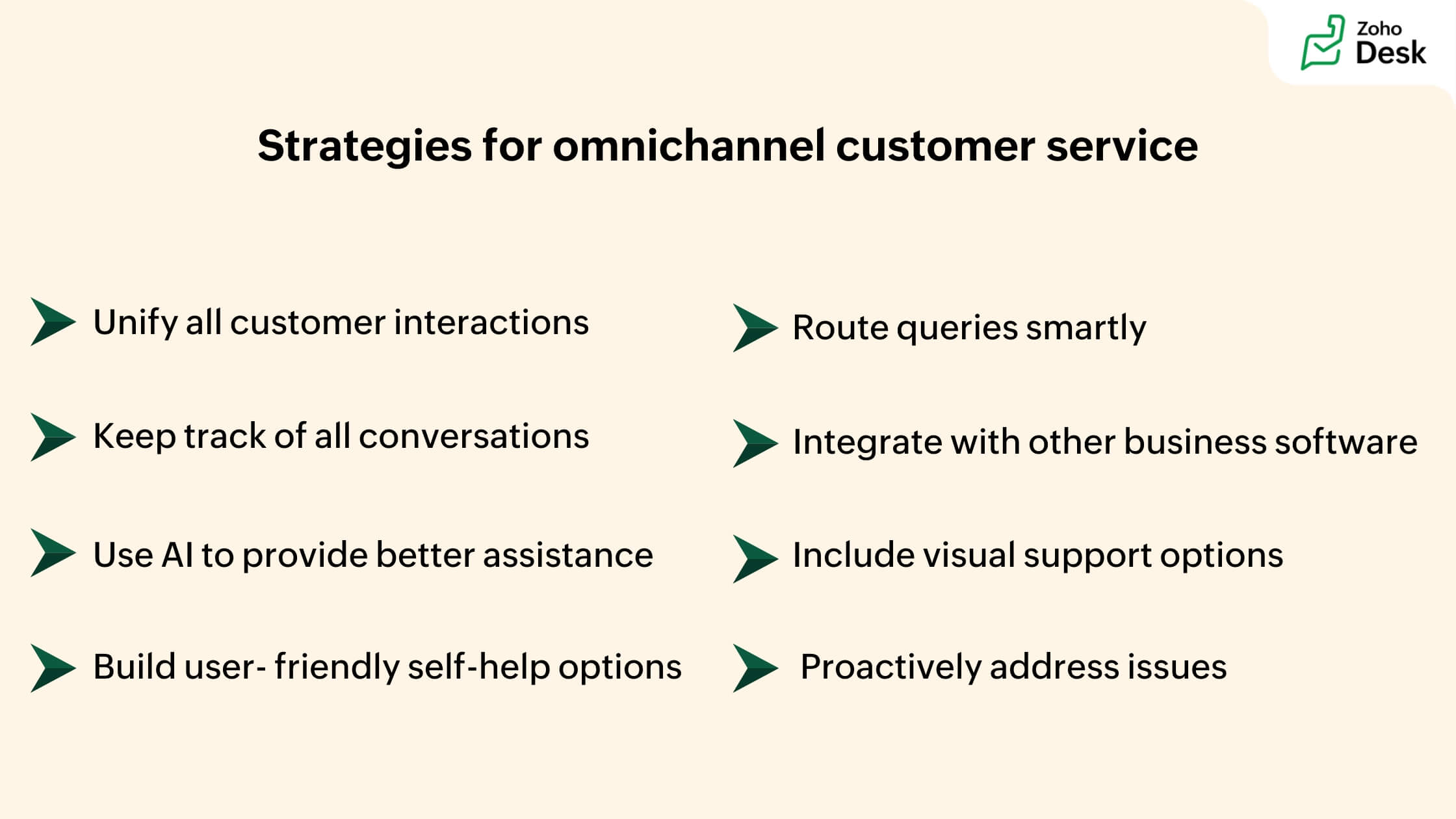- HOME
- Customer Experience
- Turn conversations into connections with omnichannel customer service
Turn conversations into connections with omnichannel customer service
- Published : May 29, 2025
- Last Updated : November 13, 2025
- 304 Views
- 4 Min Read

Imagine being served a perfectly balanced meal—one that contains all of the essential nutrients, vitamins, and minerals from various sources, presented on a single silver platter. That is exactly what omnichannel customer service provides to your customers.
What is omnichannel customer service?
As the name suggests, omnichannel customer service involves offering support across all the channels your customers use—anytime, anywhere. It's a unified system that connects every touchpoint: email, chat, phone, social media, in-app messages, and more. Whether a customer sends a message on Instagram or follows up through live chat, they receive the same level of smooth, consistent experience.
The goal is to ensure that the service feels consistent, no matter where it starts or ends. Omnichannel does not simply imply being present on every platform. It is about being connected across all of them, so your support feels smart, quick, and personalized to customer needs.
Omnichannel customer service did not arrive as a trend, it evolved as a quiet solution to a loud problem. In a typical customer journey, you might have a mix of emails, calls, social media messages, and live chats. For years, brands have been active across all of these channels but struggled to connect them. As a result, messages from potential customers can get lost.
Omnichannel approaches began to emerge when companies realized that they needed a single view of every step, channel, and interaction. Its origin does not lie in technology alone, but in the basic human need to be heard, remembered, and assisted—without starting over.
Why choose omnichannel customer service over traditional service?
Traditional customer service often treats each interaction like a fresh start. Consider this: a customer calls to report a billing issue. The next day, they follow up via email and have to explain the entire problem again. The support team has no context, no history, and the customer feels unheard and frustrated. That is the limitation of siloed, channel-specific service.
Now, compare that to an omnichannel approach. The same customer calls and then follows up via chat, and the service rep has access to the entire conversation history—no repetition, just resolution. An omnichannel ticketing system integrates all touchpoints into a single flow, creating a unified and efficient experience. It's not just about being present on every platform, it's about delivering continuity and care at every step.
Importance of omnichannel customer service
When you listen to what customers say, you realize how important omnichannel customer service actually is. People expect speed, flexibility, and familiarity—and when brands deliver, they notice. Their remarks include, “I love that I can switch from chat to email without starting all over again,” and “It feels like they remember me, even online.” Such feedback indicates more than just convenience; it shows a deeper desire for consistency and personalization. Customers do not want to explain their problems or feel like strangers with each interaction. They prefer a service that supports, remembers, responds, and adapts.
But when they have bad experiences, customers are equally vocal about it. You will hear feedback like, “I have contacted them on three platforms and still had to repeat myself,” or “I never got a reply after being promised a follow-up.” Others say, “The chatbot kept giving me generic replies—it felt robotic,” or “The app is smooth, but the support team never seems to know what is going on.” These frustrations are often a result of disconnected support, rather than a lack of it. When there is no internal communication or connect between systems, customers feel like they are talking to a wall.
This is exactly why omnichannel customer service matters. It's not about being everywhere; it's about making people feel remembered, connected, and personal. When companies provide that kind of experience, they go beyond solving customer problems to build trust and long-term relationships. In a competitive market, where all it takes is one click to switch to a new brand, winning customers' loyalty requires providing consistent support across all touchpoints.
Strategies for omnichannel customer service
What if customer service could feel more like a personal relationship with a reliable and supportive friend? These omnichannel strategies are making that future a reality.

- Unify all customer interactions
The core of omnichannel support is integrating all channels—phone, chat, social media and email—into a single platform. It guarantees that all conversations, regardless of where they begin or end, are consistent and accessible.
- Keep track of all conversations
Service agents can respond with context-rich information when they keep track of customer history across channels. This makes the omnichannel journey smooth and prevents repetition.
- Use AI to provide better assistance
AI facilitates omnichannel service by suggesting responses, summarizing conversations, and analyzing customer sentiments. It makes every interaction faster and more personalized.
- Build user-friendly self-help options
Self-service resources such as FAQs and how-to articles so that customers provide a uniform level of assistance across all platforms. They enable customers to handle problems independently and become less reliant on service agents.
- Route queries strategically
Regardless of the channel a query originates from, they should be automatically routed to the appropriate team. In an omnichannel setup, this supports efficiency and quick resolution.
- Integrate with other business software
Integrating your help desk with CRM, marketing, accounting, and other tools will give service agents full context and help maintain a consistent customer experience across all systems and channels.
- Include visual support options
Omnichannel support is made more flexible by providing options for customers to share screens or start video calls for more interactive, hands-on support, particularly for complex issues.
- Proactively address issues
To avoid frustration and facilitate quicker resolutions, alert customers about possible problems before they reach out to you. Open communication fosters trust and demonstrates how an omnichannel system enables your organization to be proactive.
In today’s connected world, customers expect seamless, consistent, and personal support—wherever they reach out. Omnichannel customer service isn’t just a trend; it’s essential for businesses to stay responsive and build lasting trust. By unifying communication and empowering service agents with full context, companies can deliver smarter, more human experiences.
Ready to transform your customer experience? Explore how Zoho Desk can help you build a powerful omnichannel support process tailored to your business needs.


